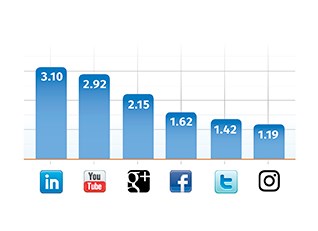Best Social Media for B2B? What’s the Answer?
Social media and content marketing are rip currents in the B2B marketing ocean right now. But, is social media important to B2B and, if so, what are the best vehicles?

B2B and Social Media: The time may not have arrived . . . but it’s coming
By Mark Semmelmayer
Chief Idea Officer
Pen & Inc. Marketing Communications
I suspect many readers here are, as I am, an aging Boomer. I wasn’t born and breast-fed on computers, iPads and smart phones, tools of the social media phenomenon. Those tools that are seemingly surgically attached to younger B2B buyers and marketers. And that might be the first cogent point here.
The B2B world is changing. Where social media is concerned, it’s becoming important, “Because B2B has a smaller potential customer base, a higher average price point, and a customer decision funnel that is more influenced by word of mouth and reputation.” -- Jay Baer, President, Convince & Convert
“Just the facts, ma’am…”
See? I’m dating myself with a reference to Sgt. Joe Friday…
The first thing in illuminating the best B2B use of social media is to lay your hands on as much empirical data as possible. Let’s start with Gardner’s own 2015 B2B Media Usage Survey among manufacturing buyers:
- Social media adoption has increased for the fourth consecutive year
- LinkedIn and YouTube continue as the most useful social media sites for manufacturing buyers
- Perception of social media as a business tool remained flat, with a below average rating of 2.6
- On a scale of 1-5, 1 being not influential and 5 being very influential in purchase decisions, the top six social media channels looked like this:

But are the facts really that stark on B2B Social?
Not really. When you broaden the inquiry to include B2B marketers, a very different picture emerges.
According to Search Engine Watch: “Hands down, LinkedIn is the best social network for B2B marketing. LinkedIn is the only real B2B social network that was developed purely to develop direct B2B sales relationships.”
When asked, one of the country’s leading e-marketing agencies, Artillery Marketing, ranked these channels as the top three for B2B: LinkedIn, Google+ and Twitter.
What’s important is not where you are. It’s what you do while you’re there.
The strategies behind both B2C and B2B social media marketing are, essentially, the same. Engage your customers via the social outlet of their choice and turn them into friends or advocates of your brand. Tactically, however, the two disciplines are very different, highlighted in three key areas:
Content
B2C: Blogs, Videos, Promotions
B2B: White Papers/eBooks, Case Studies, Webinars, One Pagers, Infographics
Channels
B2C: Facebook, Twitter, Instagram, YouTube
B2B: B2B marketers need to focus on LinkedIn, Twitter and Facebook.
Metrics
B2C: Given the nature of B2C marketing, B2C social media marketing focuses mainly on community engagement. Virality, web hits and “grins and giggles” comments are keys to successful B2C social.
B2B: The number one goal for B2B marketers is lead generation. The number one way to measure effectiveness is web traffic. Measuring where web traffic originates is key to successful B2B social.
In social media, B2B stands for “Brain to Brain”
Your primary goal in social media strategy is to offer resources and knowledge to your audiences. According to David Armano, senior vice president of digital marketing firm Edelman Digital, "The key is providing value through thought leadership."

For B2B, LinkedIn is most important. Discussion can be used for both engagement and content distribution. Like LinkedIn, Facebook and Google+ also offer group discussion pages as well as the ability to create your own company page for further engagement.
With any online marketing, it's imperative to have analytic tools that will help you set goals and measure the success of your actions. Social media is well suited for impression-based strategies. Your goal is to have your brand seen by businesses that you’ll eventually approach for sales.
This is all very nice to know, professor, but where do I start?
Need more information?
Mark Semmelmayer
Chief Idea Officer
Pen & Inc. Marketing Communications
Marietta, GA
770-354-4737
LinkedIn

- B2B marketers use, on average, six different social networking platforms. The most popular are: LinkedIn at 91%, Twitter at 85%, Facebook at 81% and YouTube at 73%. (Source: Content Marketing Institute)
- More than 70% of all B2B marketers use at least one of the “Big 4” social media sites (LinkedIn, Twitter, Facebook, and YouTube) to distribute content
- 54% of B2B marketers said they’ve generated leads from social media (Source: Content Marketing Institute)
- The B2B Social Media leader board today: <ul style="margin-top:0;margin-bottom:0;>
- LinkedIn, Twitter, Facebook, YouTube, SlideShare
- Up and comer: Google+
- 40% of B2B buyers say LinkedIn is important when researching technologies and services to purchase; 19% say the same for Twitter. (Source: Social Media Today)
- 45% of B2B marketers have gained a customer through LinkedIn. (Source: Social Media Today)
- Identify potential accounts, their favorite topics, and find out where they “live.” Most channels have a function to let you search current or targeted customers who are active/present.
- Find out where your competitors are and what they’re doing, using those same search tools.
- You don’t have to be on every network. Work on a solid presence on a few, instead of a weak presence on many.
- If you intend to invest in social media, here are a few things you should do:
- Have a Strategic Plan
It's important to spell out your objectives, strategies, and tactics.
- Build the Right Team
Put the right people in charge. The person posting on your behalf should always know your plan, your voice, and your objectives.
- Select the Right Tools
There are plenty of places to market online. Research your customers and competitors and choose wisely.
- Craft Your Content
Whether you're creating short YouTube videos demonstrating how to use products or hosting live Twitter chats, the goal should be to educate buyers.
- Embrace Partner Amplification
Every business has partners. Connect with them online. Share their posts. Leave them comments. Partners can help you to reach new audiences and partner amplification should be an ongoing priority.
- Your campaign’s ultimate goal is to generate sales. Plot out a strategy for direct contact at some point.
- Social media is part of your Integrated Marketing Communications (IMC) plan. Advertising, trade shows, web presence, search engine strategy, blogs and content creation all matter and work together. The message must always be branded and consistent.
RELATED CONTENT
-
High Quality Website Images Build Trust and Authority in Your Company and Brand
Your website does more than sell your products, services and your business — it also sells people on the reasons why they should do business with you. In a new video released by Google in January 2020, John Mueller explained how image search rankings work. The first tip was to provide high quality images. But, what is meant by “high quality?” And, why did Mueller put this tip first versus how to get “found” in image search?
-
Why Manufacturers Should Pay Attention to Web Accessibility
Accessibility doesn’t need to be thought of as a compromise that somehow reduces the aesthetic of your website. All you need to do is ensure that your design ideas are informed by accessibility standards, and you will end up with an attractive and modern website that works for the largest possible number of users.
-
Drive More Web Traffic from Social Media
These helpful social media tactics can drive more traffic to your site. If you’re consistent in your efforts, you eventually will start noticing results. How can you reap the web traffic benefit and more? Here are nine ways to help.

